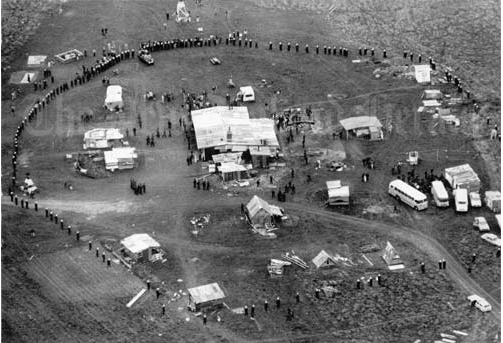ONLY A FOOL would attempt to portray sovereignty as an unimportant issue. (See The NZ Herald, Editorial, 11/2/15) It takes a special sort of smugness and a huge amount of ignorance to suggest that “practical” people don’t really care who has (or should have) the final say in their country. Only someone for whom the idea of not having the final say is genuinely inconceivable would make so absurd a claim. And only someone with no real knowledge or understanding of the past could possibly believe that sovereignty is ever acquired cheaply or relinquished lightly.
The question of precisely where sovereignty is located in Aotearoa/New Zealand is by no means an easy one to answer. Indeed, it has been many years since anyone seriously tried. The first instinct of our politicians, bureaucrats, and even of our police officers, whenever the question of sovereignty raises its deeply problematic head, is to fudge, fudge, fudge, and, if necessary, fudge again.
The last time a New Zealand political leader unequivocally asserted the indivisible sovereignty of the post-colonial Settler State was Rob Muldoon. Faced with the refusal of Ngati Whatua protesters to abandon their 506-day occupation of Auckland’s Bastion Point, Prime Minister Muldoon ordered their forcible eviction.
This was by no means a straight-forward exercise. Hundreds of Police, supported by the NZ Army, were required to remove the 218 people who refused to vacate their ancestral land. The images broadcast to New Zealand on the evening news of 25 May 1978 were deeply disturbing to a great many of its citizens – so much so, that no similar operation was authorised until the ill-starred “Operation Eight” of 2007.
Certainly, when confronted with the Whanganui people’s occupation of Pakaitore (Moutoa Gardens) in 1995, the government of Jim Bolger steadfastly refused to authorise the use of force to secure their eviction. Nearly 20 years on from Bastion Point, and with many Maori openly asserting tino rangatiratanga, or Maori Sovereignty, it was by no means certain that the protesters and their supporters would “go quietly”.
Fortunately, for the peace of the realm, the Whanganui people were equally unwilling to answer the question: ‘Who has the final say in New Zealand?’ Instead, like their warrior ancestors, they quietly “abandoned the Pa” – slipping away into the night and leaving the gardens empty.
Though the ill-fated “Operation Eight” was not launched in response to a land occupation, the manner of its execution left a great many New Zealanders – Maori and Pakeha – with a bitter taste in their mouths. The television images of heavily armed Police manning road-blocks and carrying out property searches and interrogations throughout the tiny Tuhoe settlement of Ruatoki revealed just how high the sovereignty stakes had been raised since 1978.
Any New Zealand government intending to assert state power over Maori in the second decade of the twenty-first century must anticipate considerably more than the passive resistance of Bastion Point, and the self-restraint of Pakaitore. It must be ready to use deadly force.
The Herald’s editorial writer would, of course, reject all such statements as alarmist. He is quite certain that “practical” Kiwis will never let things come to such a pass. But that is only because a willingness to compromise has always been the strongest component of the Maori-Pakeha relationship. Faced with stepping forward into open and uncompromising confrontation, Maori and the Crown (some disgruntled Pakeha might say ‘especially the Crown’) have, for the most part, chosen to step back.
But it requires an heroic leap of faith to accept that one’s country’s rulers are going to be lucky all the time. A day may come when New Zealand is again ruled by a person with the same autocratic temperament as Rob Muldoon. When the issue in dispute is too important for compromise. When neither side feels able to step back from the brink without suffering a catastrophic loss of mana. It is on that day that the all-important question: “Who has the final say in New Zealand?” will be answered. And the only “practical matters” to be considered on that day will be: Who’s will is the stronger? and, Who has the most guns?






Chris I think there is a wider picture going on here than NZ’s sovereignty. It is this ‘do we have any sovereignty at all?’. The TPPA seems likely to remove the last vestiges of our ‘sov.’ Indeed given events around the raid on the mansion in Key’s electorate, I suggest that we have already got a latent loss, that is it is hidden from general view. Fudge, fudge fudge keep the proles quiet with mindless TV reality shows, foster hope via Lotto. I could go on. Look mate it’s all over rover,
WHAT NEW ZEALAND NEEDS. A civil rights movement a la Martin Luther King. But the grass roots folk are sadly so mired in just surviving that it will take a miracle to move this forward so that all, yes all, get a fair go.
So are you saying you expect an armed Maori revolt? My guess is that the Crown wins.
70 to 80% of the NZ Armed Forces are Maori the crown will have to ring Australia & the USA because at the end of the day Maori will not turn on their own if it comes down to it.
Is the concept of being one people impossible?
No Dan the concept of one people is not impossible. Just give back to the rightful owners, all of the land illegally confiscated after the land wars. Don’t try and compensate them with todays version of beads and blankets
“A day may come when New Zealand is again ruled by a person with the same autocratic temperament as Rob Muldoon. ”
Where have you been for the last 6 years Chris Trotter? John key has that same autocratic temperament, and he has been PM since 2008. Amazing how you continue to turn a blind eye.
Comments are closed.